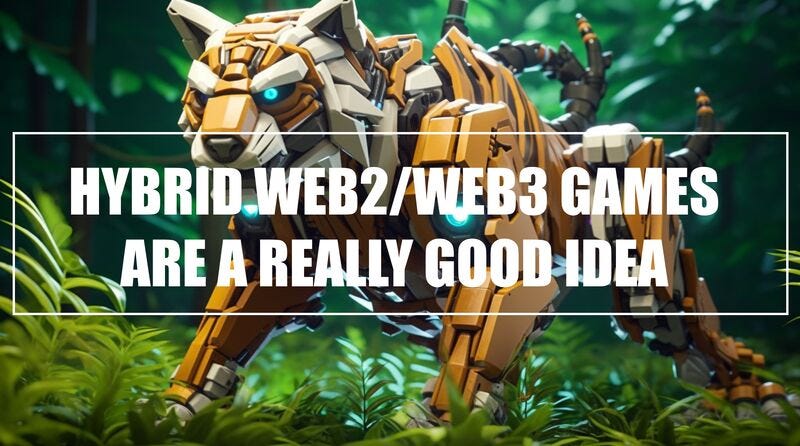The technical friction issues in web3 gaming are old hat: wallets were horrible, acquiring crypto required too many steps, and just buying an item took too long. That’s all been sorted out, but for now some games have chosen to go web2/3 hybrid (not what I’d consider web2.5, per se), a play that smooths a number of separate but icky issues. Here's why it may be the best plan in the near term:
1) Distribution.
Valve (Steam), iOS, and Android think blockchain gaming is suss because it presents a challenge to their monetization monopolies. By going hybrid, games are still able to use these distribution houses, a big win since selling a standalone client is hard, and a standalone native mobile app impossible. (NB: Obviously Epic is open to web3 games and has a slate of them coming to its store, and Axie Infinity recently got on the app store in a major win.)
This isn't easy, but it's worth it. Platforms like Steam have strict lists of requirements including:
You can't use terms like wallet or NFT.
An NFT asset cannot be visually distinct or special compared to another asset.
This requires more dev time: e.g. showing a web3 user that their item is a super flashy NFT, but not showing that to a web2 user. Annoying, but doable (I recall America’s Army doing this years ago—no matter your team, you were always the “good guys”).
Moving away from web3 terminology, however, is easy since this is where we'll end up anyway. An in-game item will be an in-game item no matter what tech drives it. If it's on-chain, that's for a given purpose (ownership and tradability, interoperability, etc.).
2) Gamers' optionality
99% of people are not crypto savvy, and there are 3.2B gamers. Some are vehemently against NFTs, but will increasingly see fun games with blockchain backbones hit the market. Hybrid games offer the best of both worlds: all players onboard as they would in any game, the crypto naive player plays as normal but buys on-chain, and both web2 and web3 players have nearly all the same experiences outside of trading and selling (or any interoperability). And maybe that's perfectly fun enough.
(NB 2: With the increased accessibility of awesome fiat on-ramp solutions, web2 users can get a wallet and still buy in fiat and not know that anything is happening on-chain. The above is more for those that are near-term actively against the blockchain world, and prefer the option.)
Aside: Interestingly, one thing I haven’t seen much of is web2 to web3 conversions of assets. We did this at Animoca/Quidd: users bought items off-chain in fiat, and those that wished to extract them onto the blockchain could do so with the push of a button. They could even burn them off chain and bring them back as a native game item. This is filled with risks particularly around credit card fraud and you need to KYC through the wazoo, but it’s a cool option I haven’t seen deployed in many places.
Many complex games have accessible surface-level experiences, but reward those who want to go deeper and MAX it. For now, part of that could be for those who want the benefit of trading or taking a game asset out of that ecosystem. It's just a side quest. For players who feel that web3 has been "forced" upon them, the hybrid option negates that (but won't stop gamer rage, obvi).
This needs the right design so you don't wind up with a two class system that feels limited to those who remain in web2 land. But with the right balance, it's hard to hate on something that offers a fully optional added experience.
I got to meet a number of smart and experienced devs over the past couple months doing exactly this. In a world where few games are a static drop with no evolution, they've decided that this is a win-win to ease getting to market, acquiring users, but integrating the web3 infrastructure for players that want to go down that path.
As web3 becomes more of a standard than a stepchild in games, these developers will be well positioned win: they've already educated and transitioned players with minimal disruption, doing it from within a game they already know and love.



